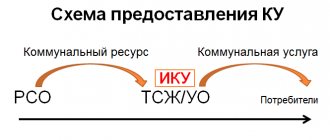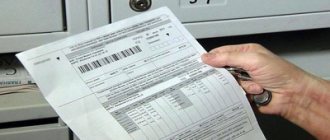When will the municipality be forced to pay debts for utilities?
Often, municipalities refuse to pay debts for utilities if the premises were rented out or provided for free use, and the housing was transferred under a social tenancy agreement. However, the courts do not always side with local authorities in such cases.
Who is required to pay utility bills?
Citizens and organizations are obliged to pay timely and in full for housing and utilities (Article 153 of the Housing Code). The obligation to pay a fee arises:
- from the tenant of the residential premises under a social rental agreement from the moment of conclusion of such an agreement;
- a tenant of residential premises of a municipal housing stock from the moment of concluding a lease agreement;
- the tenant of the residential premises of the municipal housing stock from the moment of concluding the rental agreement;
- owner of the premises.
Management companies receive payment for the provision of services for the maintenance of common property in apartment buildings, and resource supply organizations receive payment for utility resources. However, if the owners of premises in apartment buildings at the general meeting did not decide to switch to direct contracts with resource supply organizations, they transfer fees for utility resources to the management organization.
Owners of non-residential premises are required to enter into direct contracts with resource supply organizations for cold and hot water supply, sanitation, electricity supply, gas supply, and heating. This obligation is provided for in paragraph 3 of clause 7 of the Rules for the provision of utility services. An exception is the situation when the tenant has entered into a direct agreement with the resource supply or management organization.
Document: The Government approved the Rules for the Provision of Public Utilities by Resolution No. 354 dated 05/06/2011
The owners of non-residential premises transfer payments for utility resources consumed during the maintenance of common property in apartment buildings to management companies; they do not enter into direct contracts. The tenant of non-residential premises may enter into a direct agreement with the resource supply or management organization.
When will the municipality pay for residential utilities?
Let's look at when the local government body of a municipality is obliged to repay the debt for consumed utility resources and the maintenance of housing in municipal residential premises, and when not.
The premises are not occupied
If the premises are not occupied, the municipality will have to pay off the debt
When considering disputes regarding the collection of debts for housing and utilities in relation to residential premises in municipal ownership, the fact of their occupancy is of primary legal importance. If the premises are occupied, the occupants are responsible for payment.
EXAMPLE 1. A heat supply organization filed a lawsuit demanding the collection of arrears in payment of bills from the municipal administration.
The court found that some of the residential premises in the disputed building are occupied on the basis of social tenancy agreements, and some are owned by citizens. There are no unoccupied premises of municipal property in the building. The court indicated that the tenant of a residential premises under a social tenancy agreement is obliged to promptly pay for residential premises and utilities (clause 5, part 3, article 67 of the Housing Code). Therefore, the municipal administration is an improper defendant in the case. The court refused to satisfy the claim (resolution of the Arbitration Court of the North-Western District dated October 10, 2018 No. F07-10580/2018 in case No. A26-7289/2017).
If municipally owned residential premises are not occupied, the municipality will have to pay off the debt.
EXAMPLE 2. A heat supply organization filed a lawsuit against the administration of a municipality to collect arrears in payment for a utility resource supplied to municipal residential premises. There were no contracts with the management company.
The court satisfied the claims partially, collecting the debt in respect of those residential premises that were not occupied. He refused to satisfy the remaining demands. At the same time, the court noted that the local government bodies of the municipality are obliged to bear the costs of maintaining the residential premises and pay for utilities only before occupancy. Some of the premises were occupied, which the defendant was able to prove (Supreme Court ruling dated August 22, 2017 No. 303-ES17-10671 in case No. A73-5840/2016).
The fact of settlement in accordance with the established procedure has not been proven
To avoid debt collection, prove not only the fact of concluding a social tenancy agreement, but also the fact that the citizen moved into the residential premises in the prescribed manner. This procedure provides for the inspection of the residential premises by the tenant, the transfer of the premises according to the acceptance certificate, and the receipt by the tenant of the keys to the premises. The obligation to transfer the residential premises rests with the landlord (clause 1, part 2, article 65 of the Housing Code). If he did not fulfill it, and the tenant did not shy away from accepting the premises, the latter is not obliged to pay the costs of maintaining housing and utilities. This must be done by the landlord.
EXAMPLE 3. A heat supply organization filed a claim against a citizen to collect a debt. The apartment is municipal, a social rental agreement has been concluded with the citizen.
The court of first instance satisfied the stated requirements. However, the appeal did not agree with his decision. There was no evidence in the case that the citizen, having signed a social tenancy agreement, accepted residential premises from the municipality. He did not live in the premises, was not registered, and did not use public services. Consequently, the residential premises were not occupied in the prescribed manner and the owner of the property, the municipality, must pay for housing and communal services (decision of the Primorsky Regional Court dated December 15, 2015 in case No. 33-11033/2015).
If the landlord transferred the residential premises in the prescribed manner, the tenant inspected the premises, received the keys to it and signed the acceptance certificate, but did not move in on time, then the tenant will have to pay for utilities.
EXAMPLE 4. The management organization charged a citizen a fee for residential premises and utilities. The tenant considered that the fee was calculated unreasonably and demanded a recalculation in court. According to the plaintiff, he did not move into the premises and therefore should not pay for housing and utilities.
The court refused to satisfy the stated demands. The plaintiff inspected the apartment and was not deprived of access to it, but did not enter it immediately. The fact that a citizen has not lived in an apartment for a long time does not mean that he is exempt from the obligation to pay fees. The court found that the landlord provided housing in accordance with the established procedure. The plaintiff was unable to prove the untimely delivery of the keys to the apartment (appeal ruling of the St. Petersburg City Court dated July 28, 2015 No. 33-11562/2015 in case No. 2-1480/2015).
The tenant is obliged to pay for the maintenance of the residential premises and utilities from the moment when the actual opportunity to move into the apartment arose after its transfer in the prescribed manner. An exception is situations where the inability to use the apartment for its intended purpose is due to dishonest actions of the landlord. For example, the local administration did not provide the keys, refused to hand over the apartment, etc. The Presidium of the Supreme Arbitration Court took a similar position. The local government bears the cost of paying for utility services only until the municipal residential premises are occupied in the prescribed manner (Resolution of the Presidium of the Supreme Arbitration Court dated June 11, 2013 No. VAS-15066/12 in case No. A65-21717/2011).
Important to remember! The owner bears the burden of maintaining the property (Article 210 of the Civil Code). It does not matter whether such property is in state, municipal or private ownership
When will the municipality pay for utilities in non-residential premises?
The owner has the right to dispose of the property belonging to him, including renting it out (Article 209 of the Civil Code). It is the owner who is responsible for the proper maintenance of the property belonging to him (Article 210 of the Civil Code).
Previously, courts imposed the obligation to pay fees for the maintenance of common property on the tenant.
EXAMPLE 5. The management organization demanded that the tenant of non-residential premises in a residential building enter into an agreement for the maintenance of common property and pay expenses. The entrepreneur objected because she believed that the owner was obliged to do this.
The court did not impose an obligation on the defendant to conclude an agreement, but recovered from her the costs of maintaining the common property. In this case, the court referred to the provisions of Article 616 of the Civil Code. It states that the tenant must keep the property transferred to him in proper condition (resolution of the Federal Antimonopoly Service of the Moscow District dated 04/06/2011 No. KG-A41/2364-11 in case No. A41-20314/10).
Courts collect debts for utilities in leased municipal non-residential premises from local authorities
In 2011, the Presidium of the Supreme Arbitration Court indicated that neither the Civil nor the Housing Code contains provisions imposing the obligation to pay for the maintenance of premises and utilities on tenants of non-residential premises, including those located in multi-apartment residential buildings. Article 616 of the Civil Code is not applicable to these legal relations, since it regulates exclusively contractual relations between the tenant and the lessor (Resolution of the Presidium of the Supreme Arbitration Court of May 21, 2013 No. 13112/12 in case No. A72-6044/2011). Today, courts collect debts for utilities in leased municipal non-residential premises from their owners.
EXAMPLE 6. A resource supplying organization demanded that the municipal administration pay off the debt for thermal energy and hot water supplied to municipal non-residential premises. The officials refused because they had transferred the non-residential premises for rent.
The court recovered the debt for utility bills from the municipality as the owner of the premises. The resource supplying organization is not obliged to find out who actually uses the premises. The tenant of the non-residential premises did not enter into an agreement with her for the supply of utilities in accordance with current legislation and the terms of the lease agreement. Therefore, the owner of the non-residential premises must pay for the services (resolution of the Eleventh Arbitration Court of Appeal dated January 12, 2018 No. 11AP-17630/2017 in case No. A72-12672/2017).
The owner of a municipal non-residential premises leased is also required to collect the debt for the supplied utilities in relation to the common property of the apartment building.
The owner of non-residential premises in an apartment building is obliged to pay for the maintenance of common property, unless otherwise provided by the lease agreement
EXAMPLE 7. The management company filed a claim against the city district administration to collect debt for heating in relation to the common property of an apartment building. The defendant referred to the fact that the property was leased. The court indicated that the owner of non-residential premises in an apartment building is obliged to bear the costs of maintaining common property, unless otherwise provided by the lease agreement (Articles 210, 249 of the Civil Code and Part 1 of Article 39, Article 158 of the Housing Code). If there is no agreement between the tenant and the resource supplying organization, the obligation to pay for utilities lies with the owner (lessor). The court satisfied the plaintiff’s demands (resolution of the Arbitration Court of the Far Eastern District dated September 25, 2018 No. F03-3862/2018 in case No. A51-20539/2017).
If you have leased municipal property, recover the cost of utility bills from the tenant. This right of local governments is confirmed by judicial practice.
EXAMPLE 8. A resource supplying organization filed a lawsuit against the municipal administration to collect debt for utilities supplied to municipal non-residential premises. The defendant believed that it was not he who should pay the rent, but the tenant.
The court imposed the costs of paying for utilities on the owner of the property - the municipality. At the same time, the court indicated that the owner of the leased property is not deprived of the right to demand reimbursement from the tenant for the costs of paying for utilities in non-residential premises occupied under a lease agreement (resolution of the Seventh Arbitration Court of Appeal dated 01/09/2018 No. 07AP-9600/2017 on case No. A67-6032/2017).
CONCLUSIONS AND RECOMMENDATIONS:
1. The municipality must repay debts to the resource supply or management organization for utility or operational services if the municipal residential premises are not transferred to the tenant. If the tenant does not move in, expenses may be recovered from the owner. To avoid debt collection, prove that you not only entered into a social tenancy agreement, but also moved the tenant into the premises in the prescribed manner. The municipality will have to pay for utilities or maintenance services if the municipal housing unit is not transferred to the tenant.
2. Expenses for paying for utilities and maintaining common property in municipal non-residential premises leased are subject to recovery from the owner, regardless of the terms of the lease agreement. The landlord subsequently has the right to recover damages from the tenant.
3. If an agreement has been concluded between the tenant of municipal property and the management or resource supplying organization for the performance of work on the maintenance of common property or for the supply of utilities, this is the basis for collecting debt from the tenant. We recommend monitoring the conclusion of such agreements by tenants and requesting copies of them.
{\rtf1\ansi\ansicpg1251\deff0\deflang1049\deflangfe1049 {\fonttbl{\f0\fnil\fcharset204 Arial;}{\f1\fnil\fcharset204 Courier New;}{\f2\fnil\fcharset2 Symbol;}{\f3 \fnil Wingdings;}{\f4\fnil\fcharset204 Times New Roman CYR;}{\f5\fnil\fcharset204 Times New Roman;}} {\colortbl;\red0\green0\blue0;\red0\green0\blue255;\ red0\green255\blue255;\red0\green255\blue0;\red255\green0\blue255;\red255\green0\blue0;\red255\green255\blue0;\red255\green255\blue255;\red0\green0\blue128;\red0 \green128\blue128;\red0\green128\blue0;\red128\green0\blue128;\red128\green0\blue0;\red128\green128\blue0;\red128\green128\blue128;\red192\green192\blue192;\red38\ green40\blue47;\red16\green107\blue190;}{\stylesheet{\fi720\qj\hyphpar1\sb0\sa0 \f4\fs24 \snext0 Normal;} {\*\cs26\b1\cf17 \snext0\sbasedon65552 Color selection ;} {\*\cs24\b0\cf18 \snext0\sbasedon26 Hypertext link;} {\s1\qc\hyphpar1\sb108\sa108 \f4\fs24\b1\cf17 \snext0\sbasedon0 heading 1;} {\s33\ qj\hyphpar1\sb0\sa0 \f4\fs24 \snext0\sbasedon0 Normal (table);} {\*\cs65552\f4\fs24 \snext0\sbasedon65552 Color highlight for Text;} {\s65553\qc\hyphpar1\sb0\ sa0 \f5\fs20 \snext0\sbasedon0 header;} {\s65554\ql\hyphpar1\sb0\sa0 \f5\fs20 \snext0\sbasedon0 footer;} } {\*\listtable{\list\listtemplateid-15593640\listhybrid{ \listlevel\levelnfc23\levelnfcn23\leveljc0\leveljcn0\levelfollow0\levelstartat1\levelspace360\levelindent0{\leveltext\leveltemplateid68747265\'01\u-3913 ?;}{\levelnumbers;}\f2\hres0\chhres0 \fi-360\li720 \lin720 }{\listname ;}\listid1859274983}}{\*\listoverridetable{\listoverride\listid1859274983\listoverridecount0\ls1}} {\*\generator Version 0.0.0.0 from 02/19/2020.}{\info {\author NPP "Garant-Service"}{\company NPP "Garant-Service"}{\doccomm Document exported from the GARANT system}}\paperw11900\paperh16800 \margl800 \margt1440 \margr800 \margb1440 {\header \pard\plain \ltrpar \pard\ plain \s65553\fi0\li0\qc\hyphpar1\sb0\sa0 \f5\fs20 \fi0\li0\ql Sample form of a statement of claim for recovery by way of recourse from a tenant of non-residential premises...\par\pard } {\footer \ltrpar \ trowd \irow0\irowband0\trftsWidth2\trwWidth5000\trftsWidthB3\trftsWidthA3\trautofit1\trgaph0\trleft0\trbrdrt\brdrs\brdrw10\trbrdrl\brdrs\brdrw10\trbrdrb\brdrs\brdrw10\trbrdrr\brdrs\ brdrw10\clvertalt\cellx3433\cltxlrtb\ clftsWidth2\clwWidth1666\clshdrawnil \clvertalt\cellx6866\cltxlrtb\clftsWidth2\clwWidth1666\clshdrawnil \clvertalt\cellx10299\cltxlrtb\clftsWidth2\clwWidth1666\clshdrawnil \pard\plain \ intbl\itap1\s65554\fi0\li0\ql\hyphpar1\sb0\ sa0 \f5\fs20 \fi0\li0 {\field {\*\fldinst DATE \\@ "dd.MM.yyyy" \\* MERGEFORMAT }} \cell \pard\plain \intbl\itap1 \s65554\fi0\li0 \ql\hyphpar1\sb0\sa0 \f5\fs20 \fi0\li0\qc System GARANT\cell \pard\plain \intbl\itap1 \s65554\fi0\li0\ql\hyphpar1\sb0\sa0 \f5\fs20 \fi0 \li0\qr {\field {\*\fldinst PAGE \\* MERGEFORMAT }}/\pard\plain \intbl\itap1 \s65554\fi0\li0\ql\hyphpar1\sb0\sa0 \f5\fs20 \fi0\li0 \qr {\field {\*\fldinst NUMPAGES \\* Arabic \\* MERGEFORMAT }}\cell \trowd \irow0\irowband0\trftsWidth2\trwWidth5000\trftsWidthB3\trftsWidthA3\trautofit1\trgaph0\trleft0\trbrdrt\brdrs\brdrw10\ trbrdrl\brdrs\brdrw10\trbrdrb\brdrs\brdrw10\trbrdrr\brdrs\brdrw10 \clvertalt\cellx3433\cltxlrtb\clftsWidth2\clwWidth1666\clshdrawnil \clvertalt\cellx6866\cltxlrtb\clftsWidth2\cl wWidth1666\clshdrawnil\clvertalt\cellx10299\cltxlrtb\clftsWidth2\ clwWidth1666\clshdrawnil \row \pard\plain } \pard\plain \s1\qc\hyphpar1\sb108\sa108 \f4\fs24\b1\cf17 {\field{\*\fldinst {HYPERLINK “https://internet.garant .ru/document/redirect/55732358/0"}}{\fldrslt {\cs24\b0\cf18 Sample form of a statement of claim for the recovery, by way of recourse, from a tenant of non-residential premises of debt for payment of fees for operating and utility services (prepared by experts)} }}\par\pard \pard\plain \fi720\qj\hyphpar1\sb0\sa0 \f4\fs24 \fi698\qr \cs65552\f4\fs24 In [{\cs26\b1\cf17 \b1\cf17 name of the arbitration court , in\line in which the statement of claim is filed}]\par\pard \pard\plain \fi720\qj\hyphpar1\sb0\sa0 \f4\fs24 \cs65552\f4\fs24 \par\pard \pard\plain \fi720\qj \hyphpar1\sb0\sa0 \f4\fs24 \fi698\qr \cs65552\f4\fs24 Plaintiff: [{\cs26\b1\cf17 \b1\cf17 F.\~I.\~O./name}]\line if the plaintiff is a citizen:\line place of residence: [{\cs26\b1\cf17 \b1\cf17 enter the required}]\line date and place of birth: [{\cs26\b1\cf17 \b1\cf17 enter the required}]\ line place of work/date and place of state registration\line as an individual entrepreneur: [{\cs26\b1\cf17 \b1\cf17 enter the required}]\line phone/fax: [{\cs26\b1\cf17 \b1\cf17 enter the required}]\line email address: [{\cs26\b1\cf17 \b1\cf17 enter the required}]\line if the plaintiff is an organization:\line address: [{\cs26\b1\cf17 \b1\cf17 enter required}]\line phone/fax: [{\cs26\b1\cf17 \b1\cf17 enter required}]\line email address: [{\cs26\b1\cf17 \b1\cf17 enter required}]\par\ pard \pard\plain \fi720\qj\hyphpar1\sb0\sa0 \f4\fs24 \cs65552\f4\fs24 \par\pard \pard\plain \fi720\qj\hyphpar1\sb0\sa0 \f4\fs24 \fi698\ qr \cs65552\f4\fs24 Defendant: [{\cs26\b1\cf17 \b1\cf17 F.\~I.\~O./name}]\line if the defendant is a citizen:\line place of residence: [{\ cs26\b1\cf17 \b1\cf17 enter the required one}]\line date and place of birth (if known): [{\cs26\b1\cf17 \b1\cf17 enter the required one}]\line place of work (if known): [ {\cs26\b1\cf17 \b1\cf17 enter the required one}]\line [{\cs26\b1\cf17 \b1\cf17 one of the identifiers: SNILS; TIN; series and number\line of the identity document; OGRNIP; series and\line number of the driver's license; series and number\line of the vehicle registration certificate}]\line if the defendant is a legal entity:\line address: [{\cs26\b1\cf17 \b1\cf17 enter the required one}]\line TIN (if known): [{ \cs26\b1\cf17 \b1\cf17 enter the required one}]\line OGRN (if known): [{\cs26\b1\cf17 \b1\cf17 enter the required one}]\par\pard \pard\plain \fi720\qj Price of the claim : [{\cs26\b1\cf17 \b1\cf17 amount in figures and words}]\~rubles\par\pard \pard\plain \fi720\qj\hyphpar1\sb0\sa0 \f4\fs24 \cs65552\f4\fs24 \par\pard \pard\plain \s1\qc\hyphpar1\sb108\sa108 \f4\fs24\b1\cf17 Statement of claim\line for recovery by way of recourse from the tenant of non-residential premises of debt for payment of fees for operating and utility services\par \pard \pard\plain \fi720\qj\hyphpar1\sb0\sa0 \f4\fs24 \cs65552\f4\fs24 \par\pard \pard\plain \fi720\qj\hyphpar1\sb0\sa0 \f4\fs24 \cs65552 \f4\fs24 [{\cs26\b1\cf17 \b1\cf17 Day, month, year}] between [{\cs26\b1\cf17 \b1\cf17 F.\~I.\~O./name of plaintiff} ] (hereinafter referred to as the plaintiff, lessor) and [{\cs26\b1\cf17 \b1\cf17 F.\~I.\~O./name of the defendant}] (hereinafter referred to as the defendant, tenant) entered into a lease agreement for non-residential premises N\ ~[{\cs26\b1\cf17 \b1\cf17 value}], under the terms of which the plaintiff undertakes to provide the defendant for a fee for temporary possession and use of non-residential premises located in [{\cs26\b1\cf17 \b1\cf17 enter the required - residential building, retail and office building, office, etc.}] on the [{\cs26\b1\cf17 \b1\cf17 value}] floor of a [{\cs26\b1\cf17 \b1\cf17 value}]-storey building , having a total area of [{\cs26\b1\cf17 \b1\cf17 value}] sq. m and consisting of [{\cs26\b1\cf17 \b1\cf17 value}] rooms (hereinafter referred to as non-residential premises).\par\pard \pard\plain \fi720\qj\hyphpar1\sb0\sa0 \f4\fs24 \ cs65552\f4\fs24 The non-residential premises are equipped with communal infrastructure systems: [{\cs26\b1\cf17 \b1\cf17 enter what is needed - cold and hot water supply, sewerage, electricity and heat supply, provided with communication means: telephone, internet}] (paragraph [{\cs26\b1\cf17 \b1\cf17 value}] of the contract).\par\pard \pard\plain \fi720\qj\hyphpar1\sb0\sa0 \f4\fs24 \cs65552\f4\fs24 By virtue of clause [ {\cs26\b1\cf17 \b1\cf17 meaning}] of the contract, non-residential premises are provided to the defendant for [{\cs26\b1\cf17 \b1\cf17 indicate the intended use}].\par\pard \pard\plain \fi720\qj \hyphpar1\sb0\sa0 \f4\fs24 \cs65552\f4\fs24 Lease term for non-residential premises: [{\cs26\b1\cf17 \b1\cf17 indicate the term}].\par\pard \pard\plain \fi720\qj \hyphpar1\sb0\sa0 \f4\fs24 \cs65552\f4\fs24 The rented non-residential premises were transferred to the defendant [{\cs26\b1\cf17 \b1\cf17 day, month, year}] on the basis of the non-residential premises acceptance certificate.\ par\pard \pard\plain \fi720\qj\hyphpar1\sb0\sa0 \f4\fs24 \cs65552\f4\fs24 Maintenance of [{\cs26\b1\cf17 \b1\cf17 trade and office building/apartment building/other building }], in which the rented non-residential premises are located, carries out [{\cs26\b1\cf17 \b1\cf17 name of the management organization}] (hereinafter referred to as the management organization) on the basis of a management agreement N\~[{\cs26\b1\cf17 \ b1\cf17 value}] from [{\cs26\b1\cf17 \b1\cf17 day, month, year}].\par\pard \pard\plain \fi720\qj\hyphpar1\sb0\sa0 \f4\fs24 \ cs65552\f4\fs24 For the period from [{\cs26\b1\cf17 \b1\cf17 day, month, year}] to [{\cs26\b1\cf17 \b1\cf17 day, month, year}] the defendant developed debt to pay for operating and utility services in the amount of [{\cs26\b1\cf17 \b1\cf17 amount in figures and words}]\~rubles, which is confirmed by an account statement.\par\pard \pard\plain \fi720\ qj\hyphpar1\sb0\sa0 \f4\fs24 \cs65552\f4\fs24 By the final decision of [{\cs26\b1\cf17 \b1\cf17 name of the arbitration court}] dated [{\cs26\b1\cf17 \b1 \cf17 day, month, year}] in case N\~[{\cs26\b1\cf17 \b1\cf17 value}] from the plaintiff, as the owner of non-residential premises, in favor of the management organization, [{\cs26\b1\cf17 \b1\cf17 amount in figures and words}] rubles, including [{\cs26\b1\cf17 \b1\cf17 amount in figures and words}] rubles of debt for payment of fees for operating and utility services, [{\cs26\b1 \cf17 \b1\cf17 amount in figures and words}] rubles fines, [{\cs26\b1\cf17 \b1\cf17 amount in figures and words}] rubles of expenses for paying the state duty.\par\pard \pard\plain \fi720 \qj\hyphpar1\sb0\sa0 \f4\fs24 \cs65552\f4\fs24 The plaintiff executed the specified decision of the arbitration court in full, which is confirmed by payment order N\~[{\cs26\b1\cf17 \b1\cf17 value}] from [{\cs26\b1\cf17 \b1\cf17 day, month, year}].\par\pard \pard\plain \fi720\qj\hyphpar1\sb0\sa0 \f4\fs24 \cs65552\f4\fs24 Relationships the parties are regulated by the lease agreement concluded between them, regulated by the rules cf18 chapter 34}}} of the Civil Code of the Russian Federation (hereinafter referred to as the Civil Code of the Russian Federation). \*\fldinst {HYPERLINK “https://internet.garant.ru/document/redirect/10164072/20606”}}{\fldrslt {\cs24\b0\cf18 article 606}}} Civil Code of the Russian Federation under a lease agreement (property lease ) the lessor (lessor) undertakes to provide the lessee (tenant) with property for a fee for temporary possession and use or for temporary use. \fs24 In accordance with {\field{\*\fldinst {HYPERLINK “https://internet.garant.ru/document/redirect/10164072/309”}}{\fldrslt {\cs24\b0\cf18 Articles 309}} }, {\field{\*\fldinst {HYPERLINK “https://internet.garant.ru/document/redirect/10164072/310”}}{\fldrslt {\cs24\b0\cf18 310}}} Civil Code of the Russian Federation obligations must be performed properly in accordance with the terms of the obligation and the requirements of the law and other legal acts. Unilateral refusal to fulfill an obligation is not allowed.\par\pard \pard\plain \fi720\qj\hyphpar1\sb0\sa0 \f4\fs24 \cs65552\f4\fs24 By virtue of {\field{\*\fldinst {HYPERLINK “https ://internet.garant.ru/document/redirect/10164072/6162"}}{\fldrslt {\cs24\b0\cf18 paragraph 2 of article 616}}} of the Civil Code of the Russian Federation the tenant is obliged to maintain the property in good condition, at his own expense current repairs and bear the costs of maintaining the property, unless otherwise provided by law or the lease agreement.\par\pard \pard\plain \fi720\qj\hyphpar1\sb0\sa0 \f4\fs24 \cs65552\f4\fs24 cs26\b1\cf17 \b1\cf17 meaning}] the agreement establishes the obligations of the tenant in terms of maintaining the rented premises in good condition and incurring expenses for its maintenance, timely and at his own expense, carrying out routine repairs.\par\pard \pard\plain \fi720 \qj\hyphpar1\sb0\sa0 \f4\fs24 \cs65552\f4\fs24 By virtue of clause [{\cs26\b1\cf17 \b1\cf17 value}] of the contract, payment for operating and utility services is not included in the rent amount. \par\pard \pard\plain \fi720\qj\hyphpar1\sb0\sa0 \f4\fs24 \cs65552\f4\fs24 Due to {\field{\*\fldinst {HYPERLINK “https://internet.garant.ru /document/redirect/10164072/210"}}{\fldrslt {\cs24\b0\cf18 Article 210}}} of the Civil Code of the Russian Federation the owner bears the burden of maintaining the property belonging to him, in connection with which the amount of debt for payment was collected from the plaintiff for operating and utility services, penalties and legal expenses.\par\pard \pard\plain \fi720\qj\hyphpar1\sb0\sa0 \f4\fs24 \cs65552\f4\fs24 However, by virtue of paragraph [{\cs26\b1 \cf17 \b1\cf17 meaning}] of the above-mentioned lease agreement, the responsibility for timely payment of fees for operating and utility services lies with the defendant.\par\pard \pard\plain \fi720\qj\hyphpar1\sb0\sa0 \f4\fs24 \cs65552 \f4\fs24 According to {\field{\*\fldinst {HYPERLINK “https://internet.garant.ru/document/redirect/10164072/10811”}}{\fldrslt {\cs24\b0\cf18 paragraph 1 of Article 1081 }}} of the Civil Code of the Russian Federation, a person who has compensated for damage caused by another person (an employee in the performance of official, official or other labor duties, a person driving a vehicle, etc.) has the right to claim back (recourse) to this person in the amount of compensation paid, unless a different amount is established by law.\par\pard \pard\plain \fi720\qj\hyphpar1\sb0\sa0 \f4\fs24 \cs65552\f4\fs24 Thus, the plaintiff, who has repaid the defendant’s debt, has the right of recourse (recourse) to this person in the amount of the compensation paid. cf17 \b1\cf17 Day, month, year}] the plaintiff sent a claim to the defendant, in which the latter was asked to repay the debt by [{\cs26\b1\cf17 \b1\cf17 indicate the period}] from the moment of receipt of the claim by way of recourse payment for operating and utility services in the amount of [{\cs26\b1\cf17 \b1\cf17 amount in figures and words}] rubles for the period from [{\cs26\b1\cf17 \b1\cf17 day, month, year}] by [{\cs26\b1\cf17 \b1\cf17 day, month, year}].\par\pard \pard\plain \fi720\qj\hyphpar1\sb0\sa0 \f4\fs24 \cs65552\f4\fs24 This the claim was received by the defendant [{\cs26\b1\cf17 \b1\cf17 day, month, year}], which is confirmed by [{\cs26\b1\cf17 \b1\cf17 enter the required one}].\par\pard \pard\plain \fi720\qj\hyphpar1\sb0\sa0 \f4\fs24 \cs65552\f4\fs24 In order to reconcile the parties [{\cs26\b1\cf17 \b1\cf17 indicate information about the actions taken by the party (parties) aimed at reconciliation, if such actions were taken}].\par\pard \pard\plain \fi720\qj\hyphpar1\sb0\sa0 \f4\fs24 \cs65552\f4\fs24 Since to date the plaintiff’s demands have not been fulfilled voluntarily by the defendant, the plaintiff is forced file this claim in court.\par\pard \pard\plain \fi720\qj\hyphpar1\sb0\sa0 \f4\fs24 \cs65552\f4\fs24 Based on the above, guided by {\field{\*\fldinst {HYPERLINK "https://internet.garant.ru/document/redirect/10164072/309"}}{\fldrslt {\cs24\b0\cf18 Articles 309}}}, {\field{\*\fldinst {HYPERLINK "https: //internet.garant.ru/document/redirect/10164072/310"}}{\fldrslt {\cs24\b0\cf18 310}}}, {\field{\*\fldinst {HYPERLINK "https://internet. garant.ru/document/redirect/10164072/616"}}{\fldrslt {\cs24\b0\cf18 616}}}, {\field{\*\fldinst {HYPERLINK "https://internet.garant.ru/ document/redirect/10164072/1081"}}{\fldrslt {\cs24\b0\cf18 1081}}} Civil Code of the Russian Federation, {\field{\*\fldinst {HYPERLINK "https://internet.garant.ru/document/ redirect/12127526/125"}}{\fldrslt {\cs24\b0\cf18 Articles 125}}}, {\field{\*\fldinst {HYPERLINK "https://internet.garant.ru/document/redirect/12127526 /126"}}{\fldrslt {\cs24\b0\cf18 126}}} APC of the Russian Federation,\par\pard \pard\plain \fi720\qj\hyphpar1\sb0\sa0 \f4\fs24 \cs65552\f4\fs24 \par\pard \pard\plain \fi720\qj\hyphpar1\sb0\sa0 \f4\fs24 \fi698\qc \cs65552\f4\fs24 please:\par\pard \pard\plain \fi720\qj\hyphpar1\sb0 \sa0 \f4\fs24 \cs65552\f4\fs24 \par\pard \pard\plain \fi720\qj\hyphpar1\sb0\sa0 \f4\fs24 {\*\bkmkstart sub_1}\cs65552\f4\fs24 1. Collect with [{\cs26\b1\cf17 \b1\cf17 F.\~I.\~O./name of the defendant}] by way of recourse in favor of the plaintiff the amount of debt paid for him to pay for operating and utility services in the amount of [ {\cs26\b1\cf17 \b1\cf17 amount in figures and words}] rubles for the period from [{\cs26\b1\cf17 \b1\cf17 day, month, year}] to [{\cs26\b1\cf17 \ b1\cf17 day, month, year}].\par\pard {\*\bkmkend sub_1}\pard\plain \fi720\qj\hyphpar1\sb0\sa0 \f4\fs24 {\*\bkmkstart sub_2}\cs65552\ f4\fs24 2. To recover from [{\cs26\b1\cf17 \b1\cf17 F.\~I.\~O./name of the defendant}] the costs of paying the state fee.\par\pard {\*\bkmkend sub_2 }\pard\plain \fi720\qj\hyphpar1\sb0\sa0 \f4\fs24 \cs65552\f4\fs24 \par\pard \pard\plain \fi720\qj\hyphpar1\sb0\sa0 \f4\fs24 \cs65552\ f4\fs24 Appendix:\par\pard \pard\plain \fi720\qj\hyphpar1\sb0\sa0 \f4\fs24 \cs65552\f4\fs24 1) notice of delivery or other document confirming sending to other persons participating in the case , copies of the statement of claim and documents attached to it;\par\pard \pard\plain \fi720\qj\hyphpar1\sb0\sa0 \f4\fs24 \cs65552\f4\fs24 2) a document confirming payment of the state fee;\par\ pard \pard\plain \fi720\qj\hyphpar1\sb0\sa0 \f4\fs24 \cs65552\f4\fs24 3) copies of the certificate of state registration as a legal entity/individual entrepreneur;\par\pard \pard\plain \fi720 \qj\hyphpar1\sb0\sa0 \f4\fs24 \cs65552\f4\fs24 4) an extract from the unified state register of legal entities indicating the location of the plaintiff and defendant/unified state register of individual entrepreneurs;\par\pard \pard\ plain \fi720\qj\hyphpar1\sb0\sa0 \f4\fs24 \cs65552\f4\fs24 5) copy of the lease agreement for non-residential premises;\par\pard \pard\plain \fi720\qj\hyphpar1\sb0\sa0 \f4\ fs24 \cs65552\f4\fs24 6) a copy of the act of acceptance and transfer of non-residential premises;\par\pard \pard\plain \fi720\qj\hyphpar1\sb0\sa0 \f4\fs24 \cs65552\f4\fs24 7) a copy of the arbitration decision court to collect from the plaintiff the debt to pay for operating and utility services;\par\pard \pard\plain \fi720\qj\hyphpar1\sb0\sa0 \f4\fs24 \cs65552\f4\fs24 a copy of the payment order confirming the execution by the plaintiff decision of the arbitration court in full; \par\pard \pard\plain \fi720\qj\hyphpar1\sb0\sa0 \f4\fs24 \cs65552\f4\fs24 9) copies of the claim for repayment by way of recourse of debt for payment of operating fees and utilities and a document confirming its receipt;\par\pard \pard\plain \fi720\qj\hyphpar1\sb0\sa0 \f4\fs24 \cs65552\f4\fs24 10) power of attorney or other document confirming the authority to sign the claim statements;\par\pard \pard\plain \fi720\qj\hyphpar1\sb0\sa0 \f4\fs24 \cs65552\f4\fs24 11) documents confirming the performance by the party (parties) of actions aimed at reconciliation, if such actions were taken and the relevant documents are available;\par\pard \pard\plain \fi720\qj\hyphpar1\sb0\sa0 \f4\fs24 \cs65552\f4\fs24 12) [{\cs26\b1\cf17 \b1\cf17 other documents, supporting circumstances on which the plaintiff bases his claims}].\par\pard \pard\plain \fi720\qj\hyphpar1\sb0\sa0 \f4\fs24 \cs65552\f4\fs24 \par\pard \pard\plain \fi720 \qj\hyphpar1\sb0\sa0 \f4\fs24 \cs65552\f4\fs24 [{\cs26\b1\cf17 \b1\cf17 position, signature, initials, surname}]\par\pard \pard\plain \fi720\ [{\cs26\ b1\cf17 \b1\cf17 day, month, year}]\par\pard \pard\plain \fi720\qj\hyphpar1\sb0\sa0 \f4\fs24 \cs65552\f4\fs24 \par\pard }
TIN; series and number\line of the identity document; OGRNIP; series and\line number of the driver's license; series and number\line of the vehicle registration certificate}]\line if the defendant is a legal entity:\line address: [{\cs26\b1\cf17 \b1\cf17 enter the required one}]\line TIN (if known): [{ \cs26\b1\cf17 \b1\cf17 enter the required one}]\line OGRN (if known): [{\cs26\b1\cf17 \b1\cf17 enter the required one}]\par\pard \pard\plain \fi720\qj Price of the claim : [{\cs26\b1\cf17 \b1\cf17 amount in figures and words}]\~rubles\par\pard \pard\plain \fi720\qj\hyphpar1\sb0\sa0 \f4\fs24 \cs65552\f4\fs24 \par\pard \pard\plain \s1\qc\hyphpar1\sb108\sa108 \f4\fs24\b1\cf17 Statement of claim\line for recovery by way of recourse from the tenant of non-residential premises of debt for payment of fees for operating and utility services\par \pard \pard\plain \fi720\qj\hyphpar1\sb0\sa0 \f4\fs24 \cs65552\f4\fs24 \par\pard \pard\plain \fi720\qj\hyphpar1\sb0\sa0 \f4\fs24 \cs65552 \f4\fs24 [{\cs26\b1\cf17 \b1\cf17 Day, month, year}] between [{\cs26\b1\cf17 \b1\cf17 F.\~I.\~O./name of plaintiff} ] (hereinafter referred to as the plaintiff, lessor) and [{\cs26\b1\cf17 \b1\cf17 F.\~I.\~O./name of the defendant}] (hereinafter referred to as the defendant, tenant) entered into a lease agreement for non-residential premises N\ ~[{\cs26\b1\cf17 \b1\cf17 value}], under the terms of which the plaintiff undertakes to provide the defendant for a fee for temporary possession and use of non-residential premises located in [{\cs26\b1\cf17 \b1\cf17 enter the required - residential building, retail and office building, office, etc.}] on the [{\cs26\b1\cf17 \b1\cf17 value}] floor of a [{\cs26\b1\cf17 \b1\cf17 value}]-storey building , having a total area of [{\cs26\b1\cf17 \b1\cf17 value}] sq. m and consisting of [{\cs26\b1\cf17 \b1\cf17 value}] rooms (hereinafter referred to as non-residential premises).\par\pard \pard\plain \fi720\qj\hyphpar1\sb0\sa0 \f4\fs24 \ cs65552\f4\fs24 The non-residential premises are equipped with communal infrastructure systems: [{\cs26\b1\cf17 \b1\cf17 enter what is needed - cold and hot water supply, sewerage, electricity and heat supply, provided with communication means: telephone, internet}] (paragraph [{\cs26\b1\cf17 \b1\cf17 value}] of the contract).\par\pard \pard\plain \fi720\qj\hyphpar1\sb0\sa0 \f4\fs24 \cs65552\f4\fs24 By virtue of clause [ {\cs26\b1\cf17 \b1\cf17 meaning}] of the contract, non-residential premises are provided to the defendant for [{\cs26\b1\cf17 \b1\cf17 indicate the intended use}].\par\pard \pard\plain \fi720\qj \hyphpar1\sb0\sa0 \f4\fs24 \cs65552\f4\fs24 Lease term for non-residential premises: [{\cs26\b1\cf17 \b1\cf17 indicate the term}].\par\pard \pard\plain \fi720\qj \hyphpar1\sb0\sa0 \f4\fs24 \cs65552\f4\fs24 The rented non-residential premises were transferred to the defendant [{\cs26\b1\cf17 \b1\cf17 day, month, year}] on the basis of the non-residential premises acceptance certificate.\ par\pard \pard\plain \fi720\qj\hyphpar1\sb0\sa0 \f4\fs24 \cs65552\f4\fs24 Maintenance of [{\cs26\b1\cf17 \b1\cf17 trade and office building/apartment building/other building }], in which the rented non-residential premises are located, carries out [{\cs26\b1\cf17 \b1\cf17 name of the management organization}] (hereinafter referred to as the management organization) on the basis of a management agreement N\~[{\cs26\b1\cf17 \ b1\cf17 value}] from [{\cs26\b1\cf17 \b1\cf17 day, month, year}].\par\pard \pard\plain \fi720\qj\hyphpar1\sb0\sa0 \f4\fs24 \ cs65552\f4\fs24 For the period from [{\cs26\b1\cf17 \b1\cf17 day, month, year}] to [{\cs26\b1\cf17 \b1\cf17 day, month, year}] the defendant developed debt to pay for operating and utility services in the amount of [{\cs26\b1\cf17 \b1\cf17 amount in figures and words}]\~rubles, which is confirmed by an account statement.\par\pard \pard\plain \fi720\ qj\hyphpar1\sb0\sa0 \f4\fs24 \cs65552\f4\fs24 By the final decision of [{\cs26\b1\cf17 \b1\cf17 name of the arbitration court}] dated [{\cs26\b1\cf17 \b1 \cf17 day, month, year}] in case N\~[{\cs26\b1\cf17 \b1\cf17 value}] from the plaintiff, as the owner of non-residential premises, in favor of the management organization, [{\cs26\b1\cf17 \b1\cf17 amount in figures and words}] rubles, including [{\cs26\b1\cf17 \b1\cf17 amount in figures and words}] rubles of debt for payment of fees for operating and utility services, [{\cs26\b1 \cf17 \b1\cf17 amount in figures and words}] rubles fines, [{\cs26\b1\cf17 \b1\cf17 amount in figures and words}] rubles of expenses for paying the state duty.\par\pard \pard\plain \fi720 \qj\hyphpar1\sb0\sa0 \f4\fs24 \cs65552\f4\fs24 The plaintiff executed the specified decision of the arbitration court in full, which is confirmed by payment order N\~[{\cs26\b1\cf17 \b1\cf17 value}] from [{\cs26\b1\cf17 \b1\cf17 day, month, year}].\par\pard \pard\plain \fi720\qj\hyphpar1\sb0\sa0 \f4\fs24 \cs65552\f4\fs24 Relationships the parties are regulated by the lease agreement concluded between them, regulated by the rules cf18 chapter 34}}} of the Civil Code of the Russian Federation (hereinafter referred to as the Civil Code of the Russian Federation). \*\fldinst {HYPERLINK “https://internet.garant.ru/document/redirect/10164072/20606”}}{\fldrslt {\cs24\b0\cf18 article 606}}} Civil Code of the Russian Federation under a lease agreement (property lease ) the lessor (lessor) undertakes to provide the lessee (tenant) with property for a fee for temporary possession and use or for temporary use. \fs24 In accordance with {\field{\*\fldinst {HYPERLINK “https://internet.garant.ru/document/redirect/10164072/309”}}{\fldrslt {\cs24\b0\cf18 Articles 309}} }, {\field{\*\fldinst {HYPERLINK “https://internet.garant.ru/document/redirect/10164072/310”}}{\fldrslt {\cs24\b0\cf18 310}}} Civil Code of the Russian Federation obligations must be performed properly in accordance with the terms of the obligation and the requirements of the law and other legal acts. Unilateral refusal to fulfill an obligation is not allowed.\par\pard \pard\plain \fi720\qj\hyphpar1\sb0\sa0 \f4\fs24 \cs65552\f4\fs24 By virtue of {\field{\*\fldinst {HYPERLINK “https ://internet.garant.ru/document/redirect/10164072/6162"}}{\fldrslt {\cs24\b0\cf18 paragraph 2 of article 616}}} of the Civil Code of the Russian Federation the tenant is obliged to maintain the property in good condition, at his own expense current repairs and bear the costs of maintaining the property, unless otherwise provided by law or the lease agreement.\par\pard \pard\plain \fi720\qj\hyphpar1\sb0\sa0 \f4\fs24 \cs65552\f4\fs24 cs26\b1\cf17 \b1\cf17 meaning}] the agreement establishes the obligations of the tenant in terms of maintaining the rented premises in good condition and incurring expenses for its maintenance, timely and at his own expense, carrying out routine repairs.\par\pard \pard\plain \fi720 \qj\hyphpar1\sb0\sa0 \f4\fs24 \cs65552\f4\fs24 By virtue of clause [{\cs26\b1\cf17 \b1\cf17 value}] of the contract, payment for operating and utility services is not included in the rent amount. \par\pard \pard\plain \fi720\qj\hyphpar1\sb0\sa0 \f4\fs24 \cs65552\f4\fs24 Due to {\field{\*\fldinst {HYPERLINK “https://internet.garant.ru /document/redirect/10164072/210"}}{\fldrslt {\cs24\b0\cf18 Article 210}}} of the Civil Code of the Russian Federation the owner bears the burden of maintaining the property belonging to him, in connection with which the amount of debt for payment was collected from the plaintiff for operating and utility services, penalties and legal expenses.\par\pard \pard\plain \fi720\qj\hyphpar1\sb0\sa0 \f4\fs24 \cs65552\f4\fs24 However, by virtue of paragraph [{\cs26\b1 \cf17 \b1\cf17 meaning}] of the above-mentioned lease agreement, the responsibility for timely payment of fees for operating and utility services lies with the defendant.\par\pard \pard\plain \fi720\qj\hyphpar1\sb0\sa0 \f4\fs24 \cs65552 \f4\fs24 According to {\field{\*\fldinst {HYPERLINK “https://internet.garant.ru/document/redirect/10164072/10811”}}{\fldrslt {\cs24\b0\cf18 paragraph 1 of Article 1081 }}} of the Civil Code of the Russian Federation, a person who has compensated for damage caused by another person (an employee in the performance of official, official or other labor duties, a person driving a vehicle, etc.) has the right to claim back (recourse) to this person in the amount of compensation paid, unless a different amount is established by law.\par\pard \pard\plain \fi720\qj\hyphpar1\sb0\sa0 \f4\fs24 \cs65552\f4\fs24 Thus, the plaintiff, who has repaid the defendant’s debt, has the right of recourse (recourse) to this person in the amount of the compensation paid. cf17 \b1\cf17 Day, month, year}] the plaintiff sent a claim to the defendant, in which the latter was asked to repay the debt by [{\cs26\b1\cf17 \b1\cf17 indicate the period}] from the moment of receipt of the claim by way of recourse payment for operating and utility services in the amount of [{\cs26\b1\cf17 \b1\cf17 amount in figures and words}] rubles for the period from [{\cs26\b1\cf17 \b1\cf17 day, month, year}] by [{\cs26\b1\cf17 \b1\cf17 day, month, year}].\par\pard \pard\plain \fi720\qj\hyphpar1\sb0\sa0 \f4\fs24 \cs65552\f4\fs24 This the claim was received by the defendant [{\cs26\b1\cf17 \b1\cf17 day, month, year}], which is confirmed by [{\cs26\b1\cf17 \b1\cf17 enter the required one}].\par\pard \pard\plain \fi720\qj\hyphpar1\sb0\sa0 \f4\fs24 \cs65552\f4\fs24 In order to reconcile the parties [{\cs26\b1\cf17 \b1\cf17 indicate information about the actions taken by the party (parties) aimed at reconciliation, if such actions were taken}].\par\pard \pard\plain \fi720\qj\hyphpar1\sb0\sa0 \f4\fs24 \cs65552\f4\fs24 Since to date the plaintiff’s demands have not been fulfilled voluntarily by the defendant, the plaintiff is forced file this claim in court.\par\pard \pard\plain \fi720\qj\hyphpar1\sb0\sa0 \f4\fs24 \cs65552\f4\fs24 Based on the above, guided by {\field{\*\fldinst {HYPERLINK "https://internet.garant.ru/document/redirect/10164072/309"}}{\fldrslt {\cs24\b0\cf18 Articles 309}}}, {\field{\*\fldinst {HYPERLINK "https: //internet.garant.ru/document/redirect/10164072/310"}}{\fldrslt {\cs24\b0\cf18 310}}}, {\field{\*\fldinst {HYPERLINK "https://internet. garant.ru/document/redirect/10164072/616"}}{\fldrslt {\cs24\b0\cf18 616}}}, {\field{\*\fldinst {HYPERLINK "https://internet.garant.ru/ document/redirect/10164072/1081"}}{\fldrslt {\cs24\b0\cf18 1081}}} Civil Code of the Russian Federation, {\field{\*\fldinst {HYPERLINK "https://internet.garant.ru/document/ redirect/12127526/125"}}{\fldrslt {\cs24\b0\cf18 Articles 125}}}, {\field{\*\fldinst {HYPERLINK "https://internet.garant.ru/document/redirect/12127526 /126"}}{\fldrslt {\cs24\b0\cf18 126}}} APC of the Russian Federation,\par\pard \pard\plain \fi720\qj\hyphpar1\sb0\sa0 \f4\fs24 \cs65552\f4\fs24 \par\pard \pard\plain \fi720\qj\hyphpar1\sb0\sa0 \f4\fs24 \fi698\qc \cs65552\f4\fs24 please:\par\pard \pard\plain \fi720\qj\hyphpar1\sb0 \sa0 \f4\fs24 \cs65552\f4\fs24 \par\pard \pard\plain \fi720\qj\hyphpar1\sb0\sa0 \f4\fs24 {\*\bkmkstart sub_1}\cs65552\f4\fs24 1. Collect with [{\cs26\b1\cf17 \b1\cf17 F.\~I.\~O./name of the defendant}] by way of recourse in favor of the plaintiff the amount of debt paid for him to pay for operating and utility services in the amount of [ {\cs26\b1\cf17 \b1\cf17 amount in figures and words}] rubles for the period from [{\cs26\b1\cf17 \b1\cf17 day, month, year}] to [{\cs26\b1\cf17 \ b1\cf17 day, month, year}].\par\pard {\*\bkmkend sub_1}\pard\plain \fi720\qj\hyphpar1\sb0\sa0 \f4\fs24 {\*\bkmkstart sub_2}\cs65552\ f4\fs24 2. To recover from [{\cs26\b1\cf17 \b1\cf17 F.\~I.\~O./name of the defendant}] the costs of paying the state fee.\par\pard {\*\bkmkend sub_2 }\pard\plain \fi720\qj\hyphpar1\sb0\sa0 \f4\fs24 \cs65552\f4\fs24 \par\pard \pard\plain \fi720\qj\hyphpar1\sb0\sa0 \f4\fs24 \cs65552\ f4\fs24 Appendix:\par\pard \pard\plain \fi720\qj\hyphpar1\sb0\sa0 \f4\fs24 \cs65552\f4\fs24 1) notice of delivery or other document confirming sending to other persons participating in the case , copies of the statement of claim and documents attached to it;\par\pard \pard\plain \fi720\qj\hyphpar1\sb0\sa0 \f4\fs24 \cs65552\f4\fs24 2) a document confirming payment of the state fee;\par\ pard \pard\plain \fi720\qj\hyphpar1\sb0\sa0 \f4\fs24 \cs65552\f4\fs24 3) copies of the certificate of state registration as a legal entity/individual entrepreneur;\par\pard \pard\plain \fi720 \qj\hyphpar1\sb0\sa0 \f4\fs24 \cs65552\f4\fs24 4) an extract from the unified state register of legal entities indicating the location of the plaintiff and defendant/unified state register of individual entrepreneurs;\par\pard \pard\ plain \fi720\qj\hyphpar1\sb0\sa0 \f4\fs24 \cs65552\f4\fs24 5) copy of the lease agreement for non-residential premises;\par\pard \pard\plain \fi720\qj\hyphpar1\sb0\sa0 \f4\ fs24 \cs65552\f4\fs24 6) a copy of the act of acceptance and transfer of non-residential premises;\par\pard \pard\plain \fi720\qj\hyphpar1\sb0\sa0 \f4\fs24 \cs65552\f4\fs24 7) a copy of the arbitration decision court to collect from the plaintiff the debt to pay for operating and utility services;\par\pard \pard\plain \fi720\qj\hyphpar1\sb0\sa0 \f4\fs24 \cs65552\f4\fs24 a copy of the payment order confirming the execution by the plaintiff decision of the arbitration court in full; \par\pard \pard\plain \fi720\qj\hyphpar1\sb0\sa0 \f4\fs24 \cs65552\f4\fs24 9) copies of the claim for repayment by way of recourse of debt for payment of operating fees and utilities and a document confirming its receipt;\par\pard \pard\plain \fi720\qj\hyphpar1\sb0\sa0 \f4\fs24 \cs65552\f4\fs24 10) power of attorney or other document confirming the authority to sign the claim statements;\par\pard \pard\plain \fi720\qj\hyphpar1\sb0\sa0 \f4\fs24 \cs65552\f4\fs24 11) documents confirming the performance by the party (parties) of actions aimed at reconciliation, if such actions were taken and the relevant documents are available;\par\pard \pard\plain \fi720\qj\hyphpar1\sb0\sa0 \f4\fs24 \cs65552\f4\fs24 12) [{\cs26\b1\cf17 \b1\cf17 other documents, supporting circumstances on which the plaintiff bases his claims}].\par\pard \pard\plain \fi720\qj\hyphpar1\sb0\sa0 \f4\fs24 \cs65552\f4\fs24 \par\pard \pard\plain \fi720 \qj\hyphpar1\sb0\sa0 \f4\fs24 \cs65552\f4\fs24 [{\cs26\b1\cf17 \b1\cf17 position, signature, initials, surname}]\par\pard \pard\plain \fi720\ [{\cs26\ b1\cf17 \b1\cf17 day, month, year}]\par\pard \pard\plain \fi720\qj\hyphpar1\sb0\sa0 \f4\fs24 \cs65552\f4\fs24 \par\pard }
Statement of claim for collection of rent arrears
What does a claim to collect back rent mean?
A claim for collection of arrears of rent is a document that the plaintiff files with the court at the location of the defendant (or according to the jurisdiction specified in the agreement) in order to collect arrears of rent, as well as, if applicable under the terms of the lease agreement, penalties, penalties or fines. due to late payment of rent. The statement of claim sets out a demand for the protection of the rights and legitimate interests of the plaintiff, that is, a demand for debt collection and compensation for losses.
Before starting the debt collection process in court, the landlord (plaintiff) must send a demand to the tenant for debt collection on a voluntary basis, and also provide the tenant with at least 30 (thirty) days to respond. If the tenant refuses to pay the debt or fails to respond within the specified period, the landlord will have the right to file a corresponding claim. In other words, before filing a claim, the plaintiff must invite the defendant to fulfill the requirements voluntarily.
Before filing a claim in court, make sure you have the following documents:
· Claim addressed to the defendant;
· Lease contract;
· copies of receipts and other documents evidencing payment of rent for previous periods;
· calculation of the amount of debt and penalties (fines, penalties)
· other documents confirming the landlord's requirements.
The purpose of such a claim is to pay rent arrears, pay penalties or fines or penalties, as well as compensation for losses.
ps Before going to court to claim lost profits, carefully study your lease agreement. In most cases, the terms of the contract (especially those prepared by the lessor) exclude the possibility of compensation for lost profits.
How to file a claim for collection of rent?
The statement of claim for debt collection must contain:
- name of the court to which the claim is filed;
- full name of the plaintiff, his address;
- full name of the defendant, his location address;
- the essence of the dispute, the plaintiff’s demands to the defendant with reference to regulations, the defendant’s reaction to the proposal to fulfill the requirements on a voluntary basis;
- the circumstances of the case on which the claims are based, as well as evidence supporting the circumstances;
— the cost of the claim.
The plaintiff must send copies of the claim and the documents attached to it by letter with notification of delivery to all persons participating in the process. When filing a claim in court, postal notifications of delivery are attached to the statement of claim.
The statement of claim must be accompanied by:
— notification of delivery of documents to all persons participating in the process;
— a document confirming payment of the state duty;
— documents indicating the existence of circumstances on which the statement of claim is based;
— power of attorney or other document confirming the authority of the signatory, as well as some other documents.
The arbitration judge, within five days from the date of receipt of the claim by the court office, individually makes a decision on the acceptance/non-acceptance of the statement of claim for proceedings. A document confirming the acceptance of the statement of claim is a court ruling confirming the commencement of proceedings in the case. No later than the day following the day the ruling is made, the court sends copies of it to all persons participating in the process. In this case, the court may refuse to accept the statement of claim if it is filed in violation of the requirements for form and content or if the documents required by law are not attached to it.









